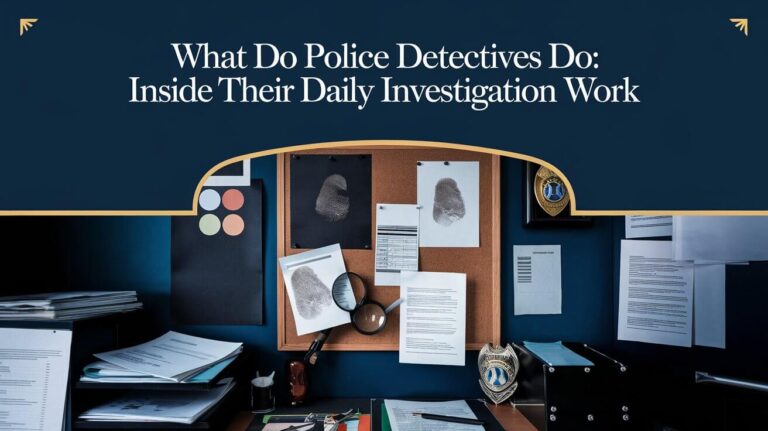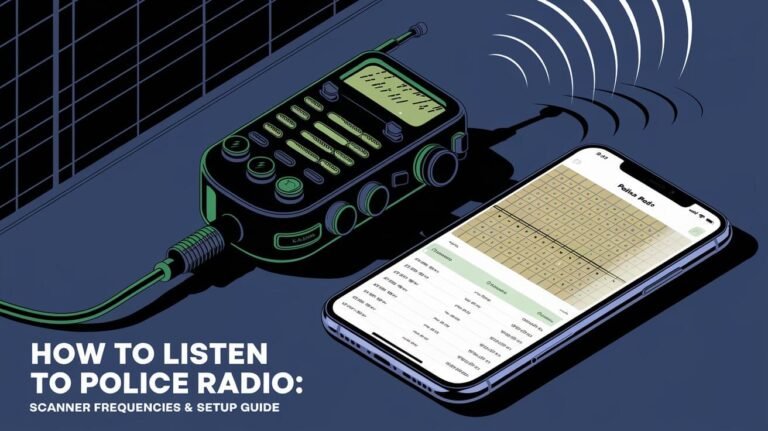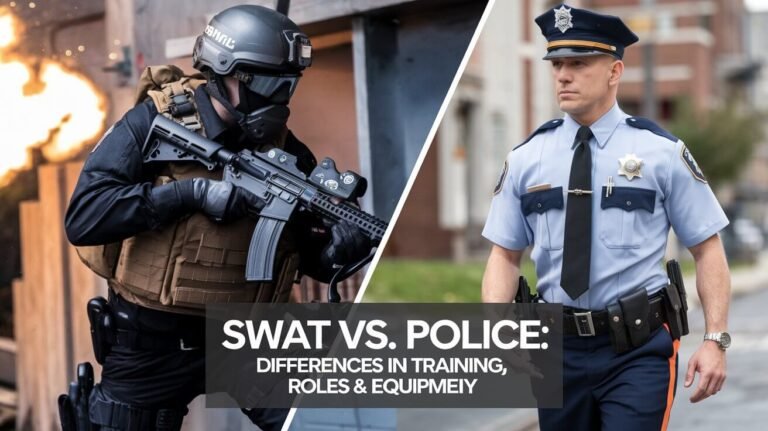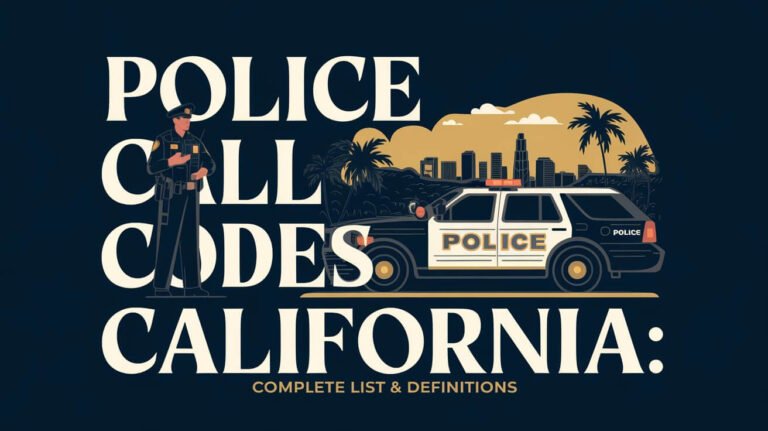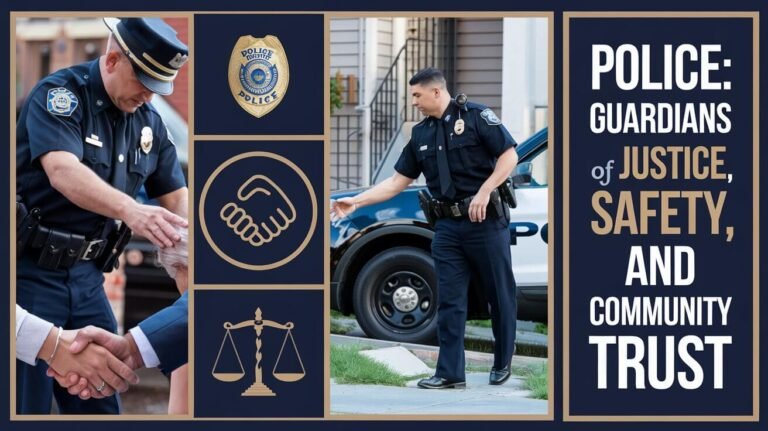State Trooper vs Police Officer: The Key Distinctions Explained
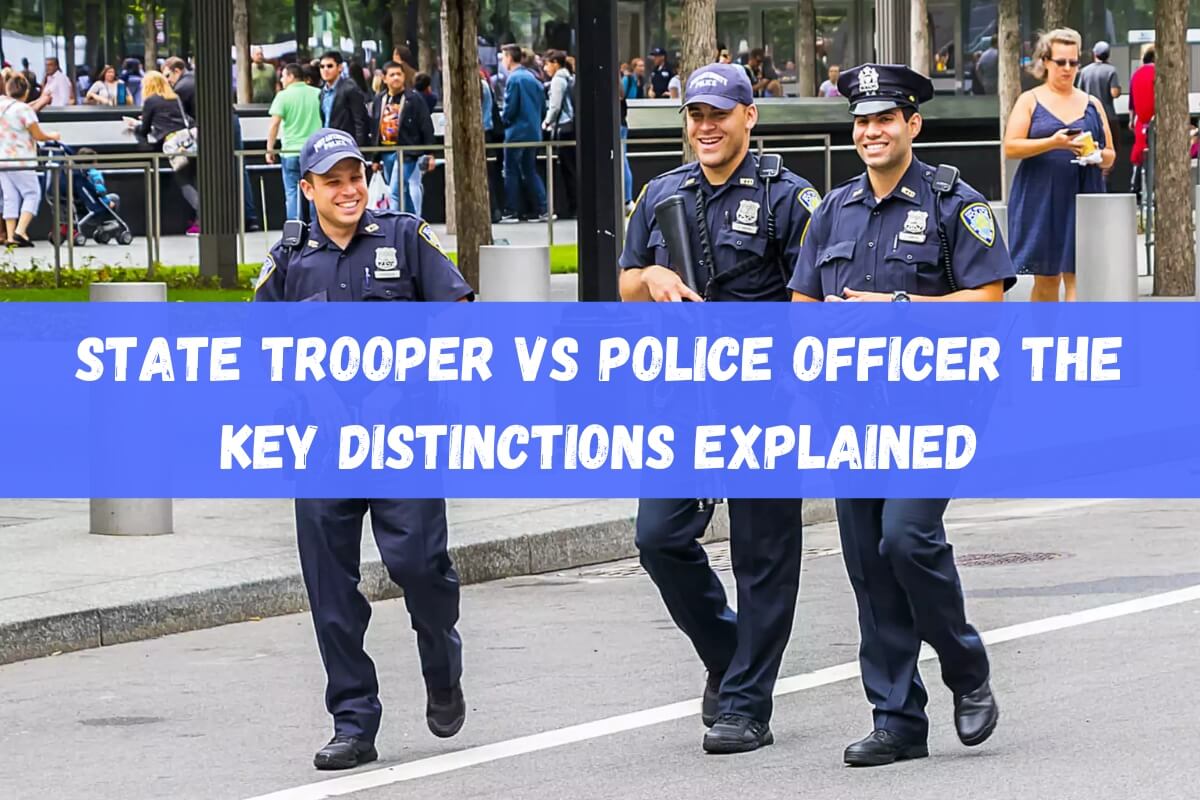
State troopers and police officers have different responsibilities and jurisdictions. State troopers work for state agencies and enforce laws statewide. Police officers work for cities or towns and enforce laws within their local areas.
Troopers focus on highways, interstate crimes, and state properties. Police patrol municipalities, respond to local calls, and handle community-level crimes. Their training requirements differ, with troopers undergoing longer state-level academy programs. Career paths also vary, with troopers typically staying at the state level while police can advance through municipal ranks.
What is a State Trooper?
A state trooper is a law enforcement officer employed by a state-level agency, such as the State Police, Highway Patrol, or Department of Public Safety. Their primary responsibilities revolve around patrolling state highways and enforcing traffic laws across the entire state.
State troopers have statewide jurisdiction, meaning they can enforce laws and make arrests anywhere within the state’s boundaries. In addition to highway patrol and traffic enforcement, state troopers may also assist local police departments with major incidents, provide security for state government buildings and officials, and participate in statewide investigations.
What is a Police Officer?
A police officer, on the other hand, is a law enforcement officer employed by a city or municipal police department. Their jurisdiction is limited to the specific city, town, or county they serve.
Police officers are responsible for a wide range of duties within their jurisdiction, including:
- Responding to emergency and non-emergency calls
- Investigating crimes
- Conducting patrols in neighborhoods and business districts
- Enforcing local laws and ordinances
- Providing community outreach and education
Unlike state troopers, whose primary focus is on highway patrol and statewide enforcement, police officers deal with a broader scope of law enforcement activities within their local area.
Jurisdictional Differences
One of the most significant differences between state troopers and police officers lies in their jurisdictions. State troopers have statewide jurisdiction, meaning they can enforce laws and make arrests anywhere within the state’s boundaries. This includes state highways, interstates, and areas outside of any specific city or municipality.
In contrast, police officers have jurisdiction only within the boundaries of the city, town, or county they serve. They do not have the authority to enforce laws or make arrests outside of their designated area, except in specific circumstances such as hot pursuit or mutual aid agreements.
State troopers have statewide jurisdiction, but focus on patrolling state highways and assisting local law enforcement when needed. Local police departments are responsible for law enforcement in their areas.
Agency & Chain of Command
State troopers and police officers also differ in the agencies they work for and their chains of command.
State troopers are part of a state-level law enforcement agency, such as the State Police, Highway Patrol, or Department of Public Safety. These agencies are typically overseen by a state-level cabinet or department, such as the Department of Public Safety or the Attorney General’s office.
Some common state trooper agencies include:
- State Police (e.g., New York State Police, Pennsylvania State Police)
- Highway Patrol (e.g., California Highway Patrol, Texas Highway Patrol)
- Department of Public Safety (e.g., Arizona Department of Public Safety, Colorado Department of Public Safety)
Police officers, on the other hand, are employed by local city or municipal police departments. These departments are typically overseen by a mayor, city council, or other local governing body.
The chain of command and organizational structure can vary between state trooper agencies and local police departments, but in general, state troopers are part of a larger, statewide agency, while police officers are part of a smaller, locally-focused department.
Primary Roles & Responsibilities
While both state troopers and police officers are tasked with enforcing laws and maintaining public safety, their primary roles and responsibilities differ significantly.
State Troopers:
- Highway and traffic enforcement: State troopers’ primary role is to patrol state highways, interstates, and other major roadways, enforcing traffic laws and ensuring the safety of motorists.
- Assisting local police: State troopers often assist local police departments with major incidents, investigations, or situations that require additional resources or specialized skills.
- Statewide patrol and response: State troopers may be called upon to respond to emergencies or incidents anywhere within the state, providing support and resources as needed.
- Executive and dignitary protection: In many states, state troopers are responsible for providing security and protection for state government buildings, officials, and visiting dignitaries.
Police Officers:
- Responding to emergency and non-emergency calls: Police officers are responsible for responding to a wide range of calls for service, including reports of crimes, disturbances, accidents, and other incidents within their jurisdiction.
- Investigating crimes: Police officers conduct investigations into criminal activities, gather evidence, interview witnesses, and make arrests when necessary.
- Community policing: Police officers play a vital role in building relationships with the communities they serve, participating in outreach programs, and addressing local concerns and issues.
- Traffic control: While not their primary focus, police officers are also responsible for enforcing traffic laws and managing traffic flow within their jurisdiction.
How Their Daily Work Differs
While the primary roles of state troopers and police officers differ, their daily work can also vary significantly.
State troopers typically spend a significant portion of their workday patrolling state highways and enforcing traffic laws. They may respond to motor vehicle accidents, conduct traffic stops, and issue citations for violations such as speeding, reckless driving, or driving under the influence.
In contrast, police officers often spend more time patrolling neighborhoods, responding to calls for service, and investigating crimes within their jurisdiction. Their daily work may involve responding to domestic disputes, conducting interviews, gathering evidence, and making arrests.
State troopers may assist local police with major incidents or investigations. Police officers may provide traffic control or support during large-scale events or emergencies.
Training & Requirements
The training and requirements for becoming a state trooper or a police officer can vary depending on the specific agency and state, but there are some general similarities and differences.
State Trooper Training
To become a state trooper, individuals typically must complete a rigorous training program at a state police academy or law enforcement training center. These training programs often last several months and cover a wide range of topics, including:
- State and federal laws
- Defensive tactics and use of force
- Firearms training
- Emergency vehicle operations
- Investigative techniques
- Report writing and documentation
In addition to the academy training, state trooper candidates may also be required to meet certain physical fitness standards, undergo background checks, and hold a valid driver’s license.
Police Officer Training
Police officer training typically involves completing a local or state-certified police academy program. These programs are generally shorter than state trooper training, often lasting between 18 to 21 weeks.
The curriculum at a police academy covers similar topics to state trooper training, including:
- Criminal law and procedures
- Defensive tactics and use of force
- Firearms training
- Emergency vehicle operations
- Report writing and documentation
- Community relations
Additionally, police officer candidates may need to meet age, education, and physical fitness requirements, as well as pass background checks and psychological evaluations.
State troopers and police officers need significant education and training to serve and protect their communities effectively.
Pay & Career Outlook
The pay and career outlook for state troopers and police officers can also differ, although both positions offer opportunities for advancement and career growth.
Salaries
According to data from the U.S. Bureau of Labor Statistics, the median annual salary for police officers and detectives in the United States is $74,910 as of May 2023. However, salaries can vary significantly depending on factors such as location, agency, and experience.
State troopers generally have higher salaries than police officers, with median annual salaries ranging from $69,999 for police and sheriff’s patrol officers in the US as of May 2024. Salaries vary widely based on state and agency.
Career Outlook
The career outlook for both state troopers and police officers is generally positive, with job growth projected in many areas. According to the U.S. Bureau of Labor Statistics, employment of police and detectives is projected to grow 3% from 2022 to 2032, about as fast as the average for all occupations.
Both state troopers and police officers have opportunities for advancement and specialization within their respective agencies. For example, state troopers may have the opportunity to join specialized units, such as:
- Criminal investigation divisions
- Tactical teams (SWAT)
- K-9 units
- Motorcycle units
- Aviation units
They may also have opportunities for promotion to supervisory or administrative positions, such as sergeant, lieutenant, captain, or even leading the state police agency as a commissioner or superintendent.
Similarly, police officers can advance their careers by pursuing specialized roles or promotions within their departments. Some potential career paths for police officers include:
- Detective roles (e.g., homicide, narcotics, or vice units)
- Special Operations Teams (SWAT)
- Community outreach or crime prevention programs
- K-9 units
- Traffic enforcement divisions
Promotions to supervisory roles, such as sergeant, lieutenant, or captain, are also common career paths for police officers.
Both state troopers and police officers may have opportunities for lateral transfers or moving between agencies, which can provide new challenges and experiences.
Can State Troopers Arrest Within City Limits?
One common question that arises when discussing the differences between state troopers and police officers is whether state troopers have the authority to make arrests within city limits or if their jurisdiction is limited to state highways and rural areas.
The answer is that state troopers generally have statewide jurisdiction, which means they can enforce state laws and make arrests anywhere within the state’s boundaries, including within city limits. However, there are some important caveats and considerations.
State troopers have arrest authority in cities, but usually let local police handle routine law enforcement to avoid duplication and confusion.
State troopers are more likely to become involved in enforcement activities within city limits when:
- Assisting local police: State troopers may assist local police departments with major incidents, investigations, or situations that require additional resources or specialized skills.
- Pursuing suspects: If a state trooper is in pursuit of a suspect or has initiated a traffic stop outside of city limits, they may continue the pursuit or enforcement action within the city.
- Statewide enforcement efforts: In some cases, state troopers may participate in statewide enforcement campaigns or initiatives, such as sobriety checkpoints or targeted enforcement zones, which may extend into city limits.
- Emergencies or disasters: During emergencies, natural disasters, or other major events, state troopers may be called upon to provide support and assistance within cities, working alongside local law enforcement agencies.
State troopers have arrest authority in cities, but they work with local police to avoid conflicts and duplication. They communicate clearly and follow established protocols to ensure smooth operations and efficient resource use.
Dual State Trooper/Police Officer Roles
In some states, there is a distinction between “state police” and “highway patrol” agencies, each with slightly different roles and responsibilities. These states effectively have two separate state-level law enforcement agencies.
For example, in Arkansas, there is both an Arkansas State Police and an Arkansas Highway Patrol. The Arkansas State Police is a full-service law enforcement agency responsible for a wide range of duties, including criminal investigations, executive protection, and assisting local law enforcement agencies. The Arkansas Highway Patrol, on the other hand, is primarily focused on highway and traffic enforcement.
Similarly, Alaska has both the Alaska State Troopers and the Alaska Highway Patrol, with the latter being a division within the State Troopers focused specifically on highway patrol duties.
In states with these dual roles, the responsibilities of the state police and highway patrol agencies may overlap to some degree, but there is generally a clear delineation of their primary functions. The state police agency typically handles more general law enforcement duties, while the highway patrol agency concentrates on enforcing traffic laws and ensuring highway safety.
Even in states with a single state-level law enforcement agency, such as California Highway Patrol or New York State Police, these agencies handle a range of duties beyond highway patrol, including criminal investigations, specialized units, and assisting local agencies.
Other Law Enforcement Roles
While state troopers and police officers are two of the most well-known law enforcement roles, some several other positions and agencies play a vital role in upholding the law and maintaining public safety.
Sheriffs and Sheriff’s Deputies
Sheriffs are elected officials who serve as the chief law enforcement officer for a county. They oversee the sheriff’s department, which is responsible for enforcing laws within the county’s boundaries, including unincorporated areas and some municipalities that do not have police departments.
Sheriff’s deputies are the sworn law enforcement officers who work under the sheriff’s command. Their duties can include patrolling, responding to calls for service, investigating crimes, serving warrants, and providing court security.
Marshals and Deputy Marshals
Marshals are law enforcement officers whose primary responsibilities include providing security for courthouses and courtrooms, serving court orders and warrants, and transporting prisoners. They may work at the federal level (U.S. Marshals Service) or the state or local level, depending on the jurisdiction.
Deputy marshals are sworn officers who work under the direction of the marshal, carrying out the agency’s duties.
Rangers
In some states, such as Texas, rangers are a specialized law enforcement agency with a long and storied history. Rangers may have statewide jurisdiction and assist with a wide range of duties, including criminal investigations, border security, and emergency response.
Game Wardens and Park Rangers
Game wardens, also known as conservation officers or wildlife officers, are responsible for enforcing hunting, fishing, and environmental protection laws. They patrol state parks, forests, and other natural areas, ensuring compliance with regulations and protecting wildlife and natural resources.
Park rangers, on the other hand, are primarily responsible for managing and maintaining state or national parks, enforcing park rules and regulations, and providing visitor services and education.
These roles, though less visible, are vital in enforcing laws and protecting the public, natural resources, and the environment.
Conclusion
In summary, while state troopers and police officers share the common goal of upholding the law and maintaining public safety, their roles, jurisdictions, and responsibilities differ significantly.
State troopers are law enforcement officers employed by state-level agencies, such as the State Police or Highway Patrol, with statewide jurisdiction. Their primary focus is on enforcing traffic laws and patrolling state highways, although they may also assist local agencies with major incidents or investigations.
Police officers, on the other hand, work for city or municipal police departments, with their jurisdiction limited to the specific city or town they serve. Their duties are more diverse, encompassing responding to calls for service, investigating crimes, and engaging in community policing efforts.
Both careers offer opportunities for advancement, specialization, and career growth, with varying training requirements, salaries, and career outlooks.
Understanding the distinctions between state troopers and police officers is essential for recognizing the diverse roles and responsibilities within the law enforcement community, and appreciating the collective efforts undertaken to ensure public safety and uphold the law.

